

Agnostic atheism. Agnostic atheism, also called atheistic agnosticism, is a philosophical position that encompasses both atheism and agnosticism.
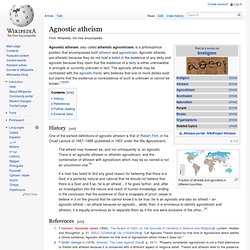
Agnostic atheists are atheistic because they do not hold a belief in the existence of any deity and agnostic because they claim that the existence of a deity is either unknowable in principle or currently unknown in fact. The agnostic atheist may be contrasted with the agnostic theist, who believes that one or more deities exist but claims that the existence or nonexistence of such is unknown or cannot be known.[1][2][3] History[edit] Open theism. Open theism is a theological movement that has developed within evangelical and post-evangelical Protestant Christianity as a response to certain ideas related to the synthesis of Greek philosophy and Christian theology.
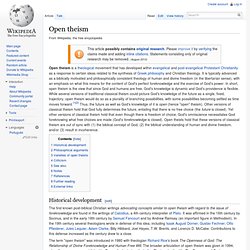
It is typically advanced as a biblically motivated and philosophically consistent theology of human and divine freedom (in the libertarian sense), with an emphasis on what this means for the content of God's perfect foreknowledge and the exercise of God's power. In short, open theism is the view that since God and humans are free, God's knowledge is dynamic and God's providence is flexible. While several versions of traditional classical theism could picture God's knowledge of the future as a single, fixed, trajectory, open theism would do so as a plurality of branching possibilities, with some possibilities becoming settled as time moves forward.[1][2] Thus, the future as well as God's knowledge of it is open (hence "open" theism).
Historical development[edit] Pro Con. History of the Separation of Church and State in America. History of the Separation of Church and State in America By - March 27, 2004 The topic of Separation of Church and State has obviously become a hot one in America with both the Supreme Court case regarding the inclusion of the phrase "under God" in the Pledge of Allegiance and President George Bush's promotion of his "faith based initiative" along with his overtly religious tone.
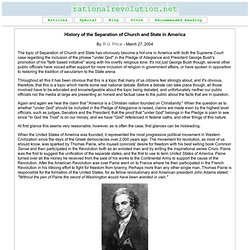
It's not just George Bush though, several other public officials have voiced either support for more inclusion of religion in government affairs, or have spoken in opposition to restoring the tradition of secularism to the State arena. Throughout all this it has been obvious that this is a topic that many of us citizens feel strongly about, and it's obvious, therefore, that this is a topic which merits some real national debate. Again and again we hear the claim that "America is a Christian nation founded on Christianity. " Thomas Paine. Deism. Deism ( i/ˈdiː.ɪzəm/[1][2] or /ˈdeɪ.ɪzəm/) is the belief that reason and observation of the natural world are sufficient to determine the existence of a Creator, accompanied with the rejection of revelation and authority as a source of religious knowledge.[3][4][5][6][7] Deism gained prominence in the 17th and 18th centuries during the Age of Enlightenment—especially in Britain, France, Germany, and the United States—among intellectuals raised as Christians who believed in one god, but found fault with organized religion and did not believe in supernatural events such as miracles, the inerrancy of scriptures, or the Trinity.[8] Deism is derived from deus, the Latin word for god.
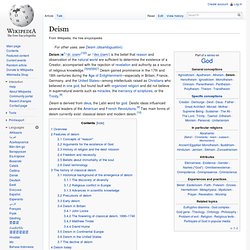
Deistic ideas influenced several leaders of the American and French Revolutions.[9] Two main forms of deism currently exist: classical deism and modern deism.[10] Overview[edit] Deism is a theological position concerning the relationship between "the Creator" and the natural world. Welcome To The Deism Site! Deism. Deism. You are here: Philosophy >> Deism Deism – Enlightened Emptiness Deism is the belief in a supreme being, who remains unknowable and untouchable.
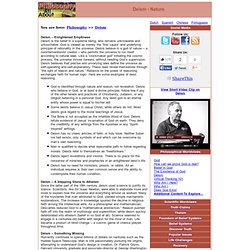
God is viewed as merely the “first cause” and underlying principle of rationality in the universe. Deists believe in a god of nature -- a noninterventionist creator -- who permits the universe to run itself according to natural laws. Like a “clockmaker god” initiating the cosmic process, the universe moves forward, without needing God’s supervision. Deism believes that precise and unvarying laws define the universe as self-operating and self-explanatory.
God is identified through nature and reason, not revelation. Deism – A Stepping Stone to Atheism Since the latter part of the 18th century, deism used science to justify its stance. Deism – Something Missing Humanity continues to spend billions of dollars on ventures such as the Hubble Space Telescope. Knowledge and reason are of little value if not utilized wisely. Deism: Its history, beliefs and practices. Spaghetti with Spinach Pesto and Turkey Meatballs. Whew…that was a stressful weekend…who would have thought a simple update would turn into a nightmare.

There we were on Friday night updating our site, when all of a sudden it disappeared! Gone…vanished… it was awful … We had wiped out our whole blog, no more recipes, no more comments, no more statistics… nothing. After moments of shock, yelling, screaming, and a few tears we calmed down and found our most recent backup. On Sunday night, after a few struggles, a little more yelling and help from tech support, we got the backup uploaded, we finally had our site back … Crisis averted.
Needless to say, we were just not in the mood to experiment in the kitchen too much, so we just made dinner, fortunately for you, it was really good and we took photos! We made turkey meatballs, but as usual decided to add a few non-traditional flavors just becasue we could. Spaghetti with Spinach Pesto and Turkey Meatballs Created By: Joanne Yield: 4 You Will Need Spinach Pesto Turkey Meatballs Directions Adam. Historical Figures With Image Map - ClipTank.com.